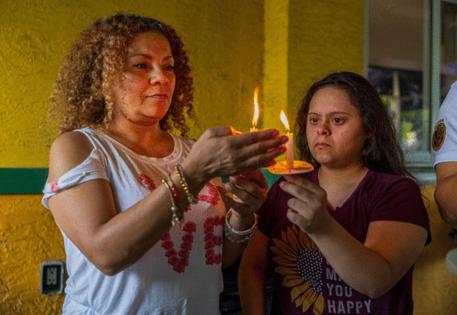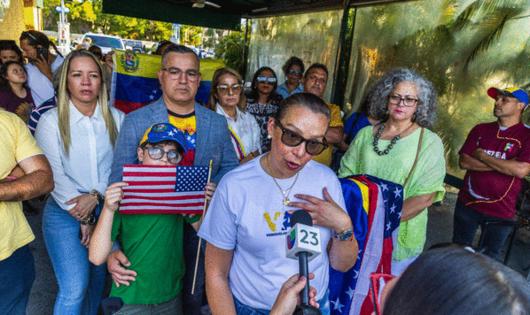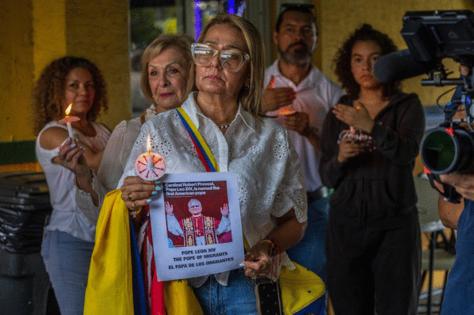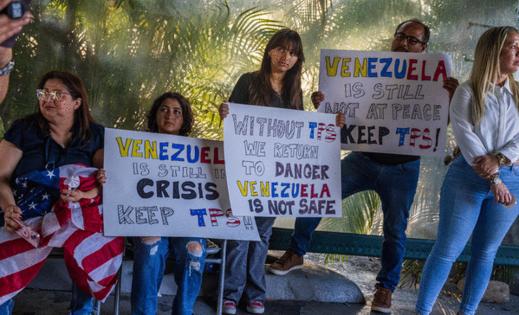'1-way ticket to a dungeon': Venezuelans anxious as Supreme Court weighs TPS decision
Published in News & Features
DORAL, Fla. — Dozens of Venezuelans gathered at El Arepazo, an iconic restaurant in the heart of Doral’s Venezuelan community, for a vigil Thursday night in support of deportation protections now under review by the U.S. Supreme Court.
The event was organized for the Venezuelan American Caucus to show support for the Venezuelan community on the final day of arguments before the high court in a case that could determine whether Temporary Protected Status for Venezuelans is upheld or revoked.
“Going back would be a one-way ticket to a dungeon or to death,” said Liduzka Aguilera. “We cannot return. It’s simply not safe.”
Aguilera, 54, is a TPS holder living in Doral with her family of four. A former criminal attorney in Venezuela, she fled political persecution and arrived in the United States in 2018, where she applied for asylum. In 2021, she and her family were granted TPS. Now, they await a pivotal decision that could determine whether they remain safe or face the threat of being sent back to a country they fear. For her, returning to Venezuela is not just unimaginable — it’s a matter of life or death.
More than 600,000 Venezuelans hold TPS, making up 66% of the Venezuelan community in the United States of more than 900,000. Over the past two decades, the U.S. has experienced a dramatic surge in its Venezuelan population, driven by a mass exodus from a country devastated by a humanitarian and political crisis.
Venezuelans are significantly less likely to be naturalized citizens than immigrants overall: in 2023, only 15% of Venezuelan immigrants had U.S. citizenship, and just 18% of Venezuelans in the United States were born in the U.S., according to the U.S. Census.
A lawsuit brought by seven Venezuelans at risk of deportation and the advocacy group National TPS Alliance challenges the Trump administration’s attempt to end TPS protections. Filed in federal court in San Francisco in February, the suit claims that the Trump administration’s decision to end TPS — which had been extended by the Biden administration — was unlawful, politically driven, and rooted in racial discrimination, part of a larger pattern of targeting non-European, non-white immigrants.
The legal fight escalated on May 1, when the administration formally asked the Supreme Court to overturn a March ruling by a federal judge in San Francisco that temporarily blocked the end of TPS for Venezuelans. That decision had come just days before protections were set to expire, potentially stripping hundreds of thousands of their legal status and right to work.
Adelys Ferro, executive director of Venezuelan American Caucus, said during Thursday night’s vigil that situations like Aguilera’s are common in the Venezuelan community. She said that among the Venezuelan TPS holders are many who were politically persecuted, requested asylum after coming to the U.S. years ago, and have their cases are pending. “With the TPS they finally have a legal status. How would these people return to Venezuela?” she asked.
Ferro warned that Venezuelans with pending asylum cases risk being sent back to face imprisonment or even death at the hands of the Nicolás Maduro regime. She stressed the devastating impact mass deportations would have, not just on individuals, but on entire communities.
“They just rescued five Venezuelans from an embassy in Caracas,” Ferro said, echoing the words of Secretary of State Marco Rubio referring to the extraction over the weekend of five opposition leaders who had holed up in the Argentinian embassy in Venezuela. “Five hostages of the criminal, usurping dictatorship of Maduro,” Ferro added. “And now, they want to send 600,000 Venezuelans back to that same regime — among them, tens of thousands who are politically persecuted.
“If thousands of Venezuelans are forced to leave the country, cities like Doral would be economically devastated,” she said. “This city was built by immigrants, especially Venezuelan immigrants. Without them, Doral wouldn’t even exist. The cost of losing them is immense, not just in human terms, which is the most important, but economically, for the cities where they live and contribute every day.”
In their arguments to the Supreme Court, the plaintiffs, represented by the Center for Immigration Law and Policy at UCLA School of Law, the ACLU Foundation of Southern California and the National Day Laborer Organizing Network, emphasized that the lower court had jurisdiction to consider the claims. They pointed to “unrebutted evidence” showing that the administration’s decision was motivated by a. discriminatory mindset.
Homeland Security Secretary Kristi Noem, they argued, justified the termination using false and inflammatory stereotypes, such as the debunked claim that Venezuela had “emptied its prisons” to send criminals to the U.S. She publicly associated Venezuelan TPS recipients with “gang members,” “dirt bags,” and “dangerous criminals,” despite data showing they have lower crime rates and higher labor force participation than the general U.S. population.
Vigils in 15 cities
Marisol Silva, 64, arrived in the U.S. in 2021 with her husband. Both are retired and could no longer afford to live in Venezuela, where the collapsing economy made even basic necessities unaffordable. They came to reunite with their daughter, a journalist who fled the country eight years earlier after being persecuted for speaking out against the regime.
Silva and her husband became TPS holders in 2023, a protection the Trump administration decided would end in April . However, a ruling by U.S. Circuit Judge Edward Chen extended the deadline, allowing them to remain in the country. Their work permits were granted under their pending asylum case, but the uncertainty surrounding their deportation status, she said, remains excruciating. In Venezuela, she added, they were affiliated with one of the country’s largest opposition parties, making the prospect of a forced return especially dangerous.
They are among nearly 350,000 Venezuelans who received TPS in 2023 and were at risk of losing the protection last month. Another 257,000 Venezuelans who were granted TPS in 2021 are facing a similar threat, with their protections scheduled to expire in September.
Thursday’s vigils were held in at least 15 cities nationwide — from Spokane, Washington, to San Juan and New York and Chicago — but the largest demonstrations took place in Florida, home to the country’s largest Venezuelan population. In Doral, Orlando, and Jacksonville, communities came together in emotional displays of solidarity, urging the courts to preserve the protections that have allowed them to build lives in the U.S.
Venezuelan Americans gathered to show support for their community regardless of immigration status. Many have family members still fighting for protection, including loved ones without legal status. Carol Quintero, 70, is one of them. Her husband, 71, who lost his legal status decades ago, was finally able to regain a measure of security through TPS. But that relief is fragile.
“I feel anxious all the time,” she said. “I’ve had panic attacks just thinking about what would happen if he lost his protection. He could be deported at any moment.” Quintero said.
Cecilia González Herrera, 26, of Orlando, is one of seven Venezuelan plaintiffs suing the Trump administration after the revocation of Temporary Proteced Status for Venezuelans. Cecilia González Herrera
Cecilia González Herrera, the only plaintiff in the San Francisco case from Florida and a resident of Kissimmee, told the Herald from Orlando that the gathering there was an expression of the community’s resilience and a call for justice.“I know it’s crucial for us to come together and show both the government and the Supreme Court that our lives are at stake,” she said.
“We are not here just as TPS holders — we are mothers, fathers, workers, and active members of our communities who contribute to this country’s progress” Herrera said. “We are here today to send a clear message: We will not give up our fight for the right to live with dignity and without fear.”
The stakes at the Supreme Court extend beyond the Venezuelan community. If the court rules in favor of the administration, it could set a sweeping precedent that limits judicial oversight of TPS decisions, affecting hundreds of thousands of immigrants from countries like Haiti, El Salvador and Nicaragua and conflict zones including Ukraine and Afghanistan.
“If the Supreme Court ruled that the judge doesn’t have the jurisdiction to overrule the secretary’s order, that would set a terrible and defining precedent for 17 countries with TPS and for other immigration processes as well”, said Ferro. “It would mean that a federal judge can’t stop, even temporarily, a decision by the Secretary of Homeland Security. It would be devastating.”
In its 41-page brief to the court, the administration argued that immigration policy decisions—such as whether to extend or terminate TPS—fall squarely within the authority of the executive branch. Solicitor General John Sauer told the court that judicial interference could undermine the “flexible, fast-paced and discretionary” nature of immigration enforcement.
Despite the administration’s claim that continued TPS protection for Venezuelans is “contrary to the national interest,” critics argue that revoking it amid Venezuela’s ongoing humanitarian crisis is both inhumane and unjustified.
“I feel unprotected. But I’ve talked to my husband. If TPS is revoked, we won’t leave. We’ll wait for our asylum hearing,” Silva said. “I still have hope that one day we will see a free Venezuela. But until that day comes, we simply cannot go back.”
©2025 Miami Herald. Visit at miamiherald.com. Distributed by Tribune Content Agency, LLC.














Comments